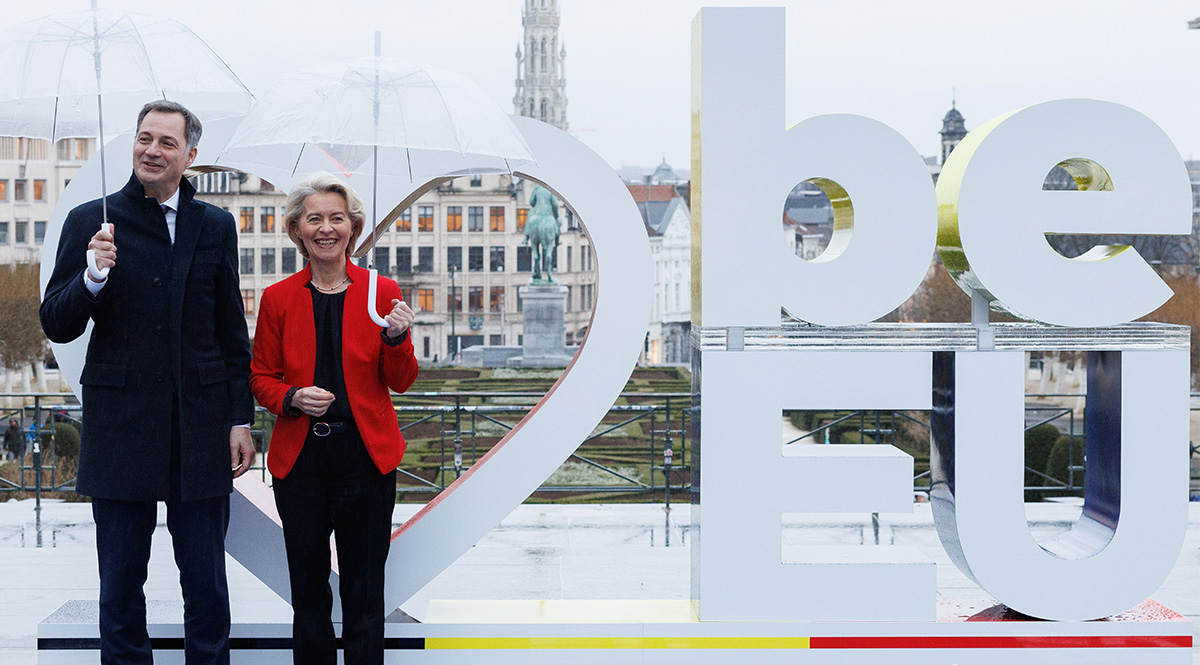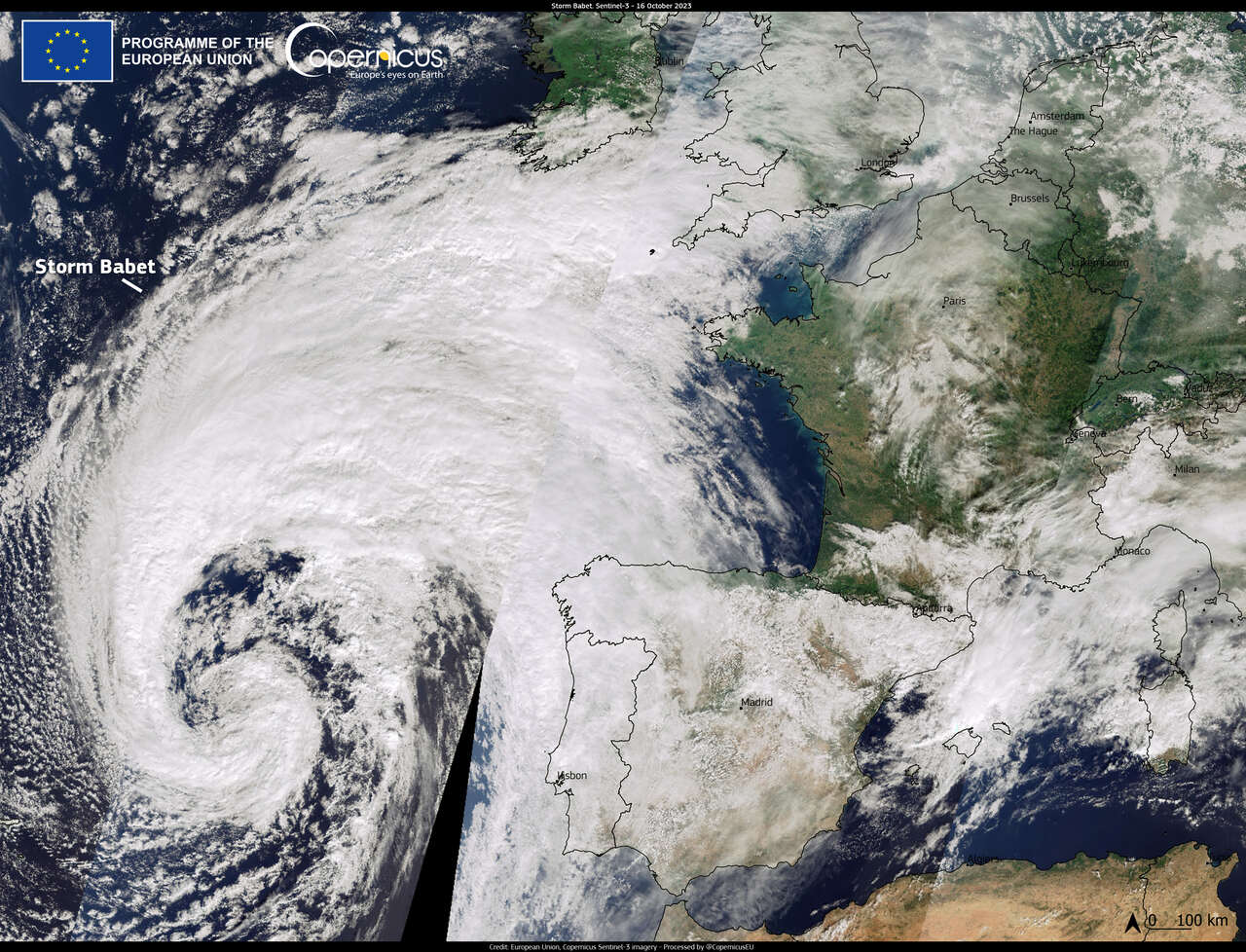Belgium Takes Over Presidency of the Council of the European Union
On 1 January, Belgium took over the six-month presidency of the Council of the European Union (the Council) from Spain. Its programme assumes the finalisation or continuation of the most important projects undertaken by the EU institutions before the end of the 9th term of the European Parliament (2019-2024), e.g., the debate on EU reform, the financial support program for Ukraine, the migration and asylum package, or the green transformation. The Presidency also wants to build consensus among member states regarding the reform of the EU financing system. The country supports the actions to further tighten integration and strengthen the competences of EU institutions.
 BENOIT DOPPAGNE / Belga Press / Forum
BENOIT DOPPAGNE / Belga Press / Forum
Determinants and Contexts of the Presidency
The time for effective legislative activities in the EU will be shortened by the European Elections of 6–9 June. The last meeting of the European Parliament of the 9th term, during which it may approve the compromises reached in negotiations with the Council, will be held on 22–25 April. Charles Michel, President of the European Council (EUCO), will also run in these elections, becoming involved in conducting the campaign and, if elected, resigning from his current position. As a consequence, his electoral activities will complicate cooperation between the Presidency and the EUCO. The federal parliamentary elections of 9 June will contribute to strengthening in the European debate of key issues in Belgian politics (e.g., immigration policy and EU financing). Polls show low support for the liberal democratic party of Prime Minister Alexander De Croo (Open Vld: 5%) and high support for the right-wing Flemish party Vlaams Belang (25%). Also important are the numerous programme discrepancies (e.g., regarding aid to Ukraine) between Belgium and Hungary, as the next country to take over the Council presidency (1 July – 31 December). This will strengthen the need for Belgium to cooperate with Poland, which will take over this function later (1 January – 30 June 2025). Belgium’s experience from its previous twelve presidencies will be helpful in overcoming difficulties related to the end of the current political cycles (EU and national) and the calendar of subsequent presidencies.
Belgium’s plans are strongly conditioned by the tasks inherited from the Spanish presidency, which should be completed before the EP elections. The previous presidency focused—in addition to such long-term goals as promoting reindustrialisation and strategic autonomy of the EU, green transformation, social and economic justice, and European unity and EU reform—on support for Ukraine’s war effort, EU enlargement and migration policy. In particular, it supported the revision of the EU’s multiannual financial framework (MFF), under which the EC proposed increasing the EU budget by EUR 30 billion and granting Ukraine EUR 50 billion in financial support until 2027, which was vetoed by Hungary during the European Council summit on 14–15 December last year. At the same time, the EUCO approved the decision to open accession negotiations with Ukraine, Moldova, Bosnia and Herzegovina and North Macedonia, as well as granting Georgia candidate status. On 20 December last year a preliminary agreement was also reached between the European Parliament and the European Union on the adoption of the Pact on Migration and Asylum. Spain managed to pilot adopting the EU’s position on the amendments to the Stability and Growth Pact, which regulates, among others, limits on public debt and budget deficit of EU countries. Belgium will continue to renegotiate the MFF (especially the approval of aid before the EU-Ukraine summit on 3 February), work out a Council-European Parliament compromise on fiscal rules, as well as negotiations on treaty reform in the context of enlargement. In this last issue, important political reference points are the Franco-German expert report from September last year, the EP resolution from November last year and conclusions of the European Council of December last year announcing the adoption of a work schedule in this matter by the summer. Other portfolios requiring completion of legislative work before the end of the 9th European Parliament term include the migration pact and the Net-Zero Industry Act.
Belgium’s Programme Proposals
They are an extension of the Spanish proposals. In particular, Belgium wants to ensure that the Council and the European Parliament adopt regulations regarding the Pact on Migration and Asylum (vote scheduled for March). It also plans to strengthen the external dimension of migration and asylum policy, especially cooperation with African countries. In addition, activities are planned to strengthen European integration in the field of EU security and defence policy, in particular the commencement of work on the European industrial strategy for the defence industry. Belgium will also try to strengthen existing mechanisms to protect the rule of law, including continuing ongoing procedures based on Art. 7 TEU, as well as developing the system of conditionality to protect the EU budget introduced as part of the REPowerEU programme. The Presidency also intends to implement the European Democracy Action Plan and will initiate work on strengthening the democratic resilience of the EU. It plans to use instruments developed as part of the EU Strategic Compass to protect the European Elections process, such as tools to combat disinformation, foreign information manipulation and interference (FIMI). Finally, Belgium emphasises the need for lasting changes in the EU’s financing system. In response to the growing Eurosceptic tendencies, which increasingly limit the ability of EU governments to consent to increases in membership fees, the Presidency supports the European Commission’s proposals to expand the system of sources of the EU's own revenues, modelled on the EU tax on unprocessed plastic adopted in 2021.
With regard to improving the EU’s economic competitiveness, Belgium plans to continue its efforts both to strengthen the single market and to defend the global multilateral trading system based on international law (especially the role of the WTO, paralysed by the Sino-American rivalry). In particular, it supports the finalisation of the banking and capital markets union, including by undertaking work on an EU retail investment strategy and the Listing Act, which would increase the competitiveness of EU clearing services and encourage private investment in the economy. Belgium also plans to strengthen the strategic resilience and autonomy of the Union (especially value chains) and reduce the risk of dependence in critical sectors on potentially hostile third countries. The Presidency emphasises the importance of a comprehensive and fair approach to the tasks of Member States in the field of green transition. The aim of this process should be to ensure that EU consumers have a secure supply of energy at affordable prices and move towards achieving climate neutrality, as well as to defend the EU’s autonomy in food production. Based on its experience during the COVID-19 pandemic, Belgium supports strengthening the EU’s resilience in crisis situations, including the security of medicine supplies, and developing a strategy to increase the number of health and care workers in the EU. The Presidency also plans to promote the strengthening of the health care system as a basis for achieving universal health coverage, ensuring equal access for all EU citizens to innovative, resilient, sustainable and high-quality health services and medicines.
Conclusions for Poland
The Belgian Presidency represents a federalisation perspective in looking at the future of the EU. This results in its detailed programme proposals regarding the European military industrial strategy, banking union and fiscal reform. However, it is the tasks inherited by Belgium from Spain which seem to be crucial and should be completed before the upcoming European Elections, especially the package of budget and fiscal negotiations and the legislation implementing the migration pact. From Poland’s point of view, the Belgian programme may cause differences of opinion regarding such areas of integration as stronger unification of foreign and security policy or social policy. Although Belgium’s promotion of the rule of law at the EU forum will lose practical importance in relation to Poland, it may be crucial for accession negotiations with Ukraine and other countries (especially in connection with combating corruption), as well as in relation to Hungary. If—despite the divergence of opinions among the governments of other Member States and the temporarily weakened position of the President of the European Council—Belgium manages to work out the foundations of an agreement on the EU reform and the EU decides to establish the European Convention, then the key task of the Polish Presidency will be to continue this process after the period of expected slowdown in work by Hungarian Presidency.



.jpg)

